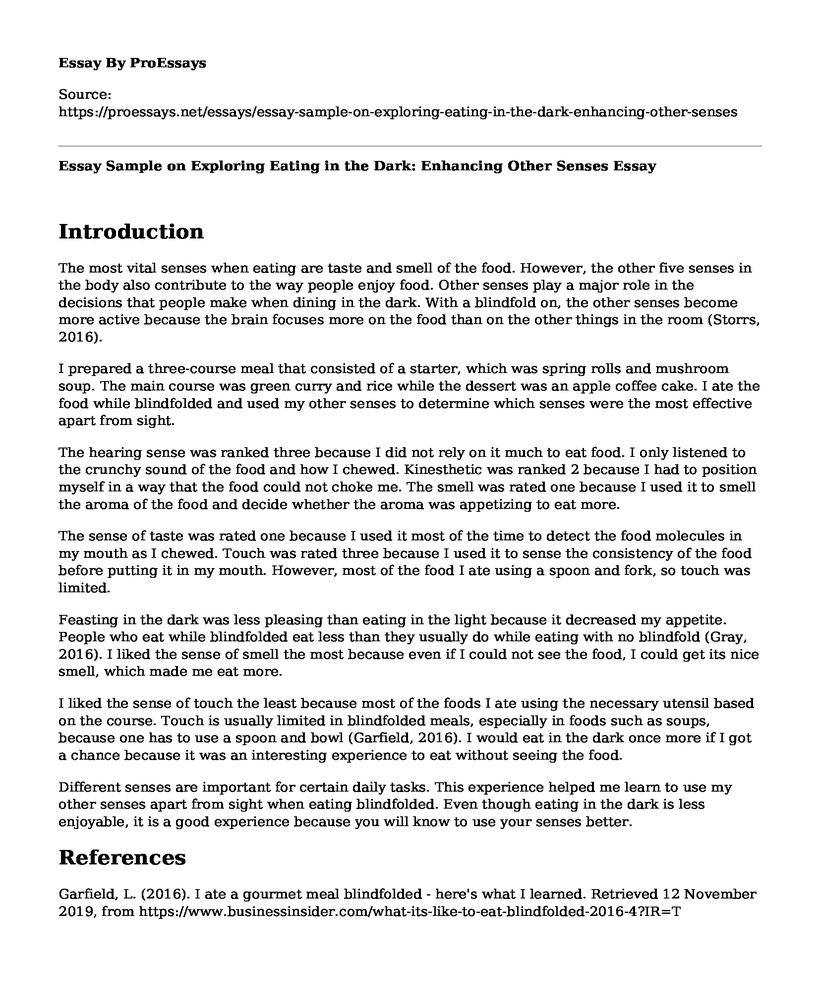Introduction
The most vital senses when eating are taste and smell of the food. However, the other five senses in the body also contribute to the way people enjoy food. Other senses play a major role in the decisions that people make when dining in the dark. With a blindfold on, the other senses become more active because the brain focuses more on the food than on the other things in the room (Storrs, 2016).
I prepared a three-course meal that consisted of a starter, which was spring rolls and mushroom soup. The main course was green curry and rice while the dessert was an apple coffee cake. I ate the food while blindfolded and used my other senses to determine which senses were the most effective apart from sight.
The hearing sense was ranked three because I did not rely on it much to eat food. I only listened to the crunchy sound of the food and how I chewed. Kinesthetic was ranked 2 because I had to position myself in a way that the food could not choke me. The smell was rated one because I used it to smell the aroma of the food and decide whether the aroma was appetizing to eat more.
The sense of taste was rated one because I used it most of the time to detect the food molecules in my mouth as I chewed. Touch was rated three because I used it to sense the consistency of the food before putting it in my mouth. However, most of the food I ate using a spoon and fork, so touch was limited.
Feasting in the dark was less pleasing than eating in the light because it decreased my appetite. People who eat while blindfolded eat less than they usually do while eating with no blindfold (Gray, 2016). I liked the sense of smell the most because even if I could not see the food, I could get its nice smell, which made me eat more.
I liked the sense of touch the least because most of the foods I ate using the necessary utensil based on the course. Touch is usually limited in blindfolded meals, especially in foods such as soups, because one has to use a spoon and bowl (Garfield, 2016). I would eat in the dark once more if I got a chance because it was an interesting experience to eat without seeing the food.
Different senses are important for certain daily tasks. This experience helped me learn to use my other senses apart from sight when eating blindfolded. Even though eating in the dark is less enjoyable, it is a good experience because you will know to use your senses better.
References
Garfield, L. (2016). I ate a gourmet meal blindfolded - here's what I learned. Retrieved 12 November 2019, from https://www.businessinsider.com/what-its-like-to-eat-blindfolded-2016-4?IR=T
Gray, R. (2016). Could eating in the dark help you lose weight?. Retrieved 12 November 2019, from https://www.dailymail.co.uk/sciencetech/article-3460747/Could-eating-dark-help-lose-weight-Blindfolding-diners-leads-eat-food-feel-fuller.html
Storrs, C. (2016). Are your eyes really 'bigger than your stomach'? Studies put it to the test. Retrieved 12 November 2019, from https://edition.cnn.com/2016/04/08/health/eating-without-seeing-dining-in-dark/index.html
Cite this page
Essay Sample on Exploring Eating in the Dark: Enhancing Other Senses. (2023, Feb 27). Retrieved from https://proessays.net/essays/essay-sample-on-exploring-eating-in-the-dark-enhancing-other-senses
If you are the original author of this essay and no longer wish to have it published on the ProEssays website, please click below to request its removal:
- The Process of Blood Flow and Sporting Events
- Zebras Research Paper
- Interaction Between Fungus and Plants Also Fungus and Animals Essay
- A Discussion on Respiratory System Paper Example
- Plant Gene Breading and Human Gene Editing Paper Example
- Photosynthesis: Light, Water and Oxygen for Plants - Essay Sample
- Essay Sample on Rivers: Dynamic Ecosystems from Headwaters to Mouth







